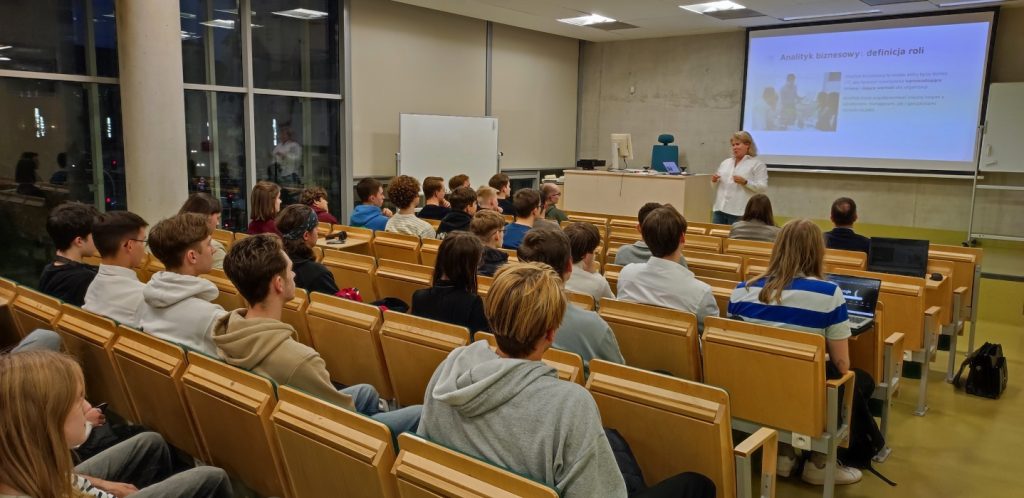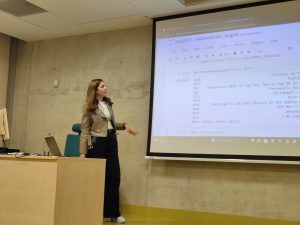
The inaugural meeting of the Student Research Group “Data Science” in the academic year 2024/2025 was held at the Poznań University of Economics and Business. During the meeting, the planned activities of the SRG Data Science and proposals for areas of activity in the coming months were discussed. Additionally, employees of our Department presented the opportunities and challenges related to data analysis in various areas.
At the beginning of the meeting, Prof. Agata Filipowska presented the role of a modern business analyst who combines business knowledge with IT skills to create valuable solutions for the organization. A modern analyst should understand data, forecast trends and recommend actions. Programming skills allow for the analysis of large data sets, process automation and data integration from various sources. The growing importance of data in business means that employers are increasingly looking for business analysts with programming skills.
Prof. Krzysztof Węcel presented issues related to natural language processing. Particular attention in the presentation was paid to the vector representation of words, which allows for the mathematical mapping of their meaning. This method consists of representing words as points in a multidimensional space, where each coordinate represents a certain feature of the word. Popular algorithms such as Word2Vec, GloVe, or FastText learn these representations from large text corpora, capturing semantic and syntactic relationships between words. As a result, words with similar meaning are located close to each other in this vector space.
 The practical use of NLP techniques was presented by Izabela Czumałowska using the example of a book recommendation system and sentiment analysis using the Python programming language. These systems were developed and described as part of diploma theses (bachelor’s and master’s) defended at the Poznań University of Economics and Business. Book recommendation systems analyze user preferences to suggest new titles. Sentiment analysis allows you to understand the emotional tone of reviews and readers’ opinions. Knowledge of data analysis and programming can enable the creation of increasingly better recommendation algorithms and sentiment analysis tools that can contribute to improving the quality of goods and services provided.
The practical use of NLP techniques was presented by Izabela Czumałowska using the example of a book recommendation system and sentiment analysis using the Python programming language. These systems were developed and described as part of diploma theses (bachelor’s and master’s) defended at the Poznań University of Economics and Business. Book recommendation systems analyze user preferences to suggest new titles. Sentiment analysis allows you to understand the emotional tone of reviews and readers’ opinions. Knowledge of data analysis and programming can enable the creation of increasingly better recommendation algorithms and sentiment analysis tools that can contribute to improving the quality of goods and services provided.
The possibilities of open data and the limitations of generative artificial intelligence (GenAI) were discussed by Dr. Włodzimierz Lewoniewski. The presentation included examples of using popular open information sources, which provide almost unlimited possibilities for research and innovation. The benefits of their use include access to current information and acceleration of decision-making processes. Preparation and analysis of large amounts of data often requires programming skills. Publicly available GenAI tools (such as ChatGPT, Gemini, Copilot, Claude) can facilitate this process. However, it is worth remembering that these tools are based on the data on which they were trained and operate within the framework of defined algorithms. Programmers, on the other hand, must create solutions for unique problems that do not always have standard answers. Additionally, data analytics often requires a deep understanding of the business and cultural context, interpretation of ambiguous results, and decision-making based on uncertain data. Human creativity and the ability to think outside the box are key in these roles and cannot be fully replaced by GenAI.
The assumptions of the student research group’s activity and proposals for areas of activity for the next academic year were presented by Patryk Danielewicz, representative of the board of SRG Data Scienice. Among other things, workshops on the basics of programming in Python, the basics of data analysis, data visualization using dedicated libraries and an overview of machine learning algorithms with their practical use are planned. As part of the planned classes, each participant will have the opportunity to implement their own projects related to data analysis and processing.
The inaugural meeting was held on October 24, 2024. The aim of the research group is to promote knowledge about Data Science and data analysis using information technologies among students, teach and improve students’ skills in computer programming by implementing research projects, cooperate with other student organizations to implement projects and exchange experiences.
SKN Data Science Facebook page: facebook.com/SKNDataScienceUEP